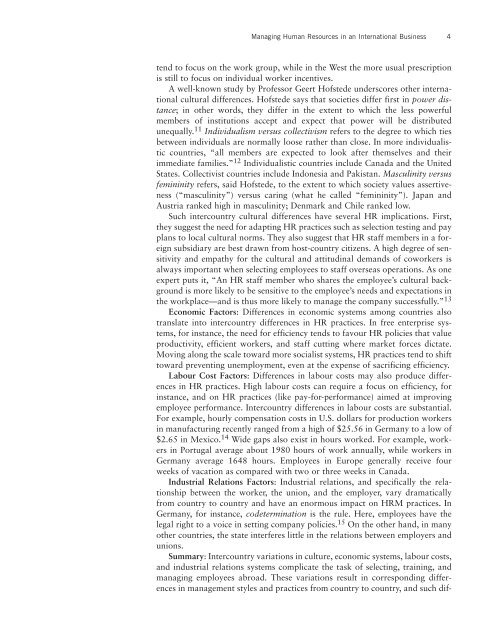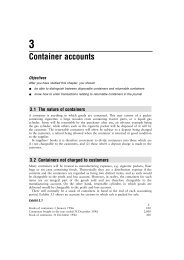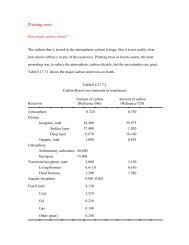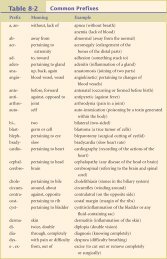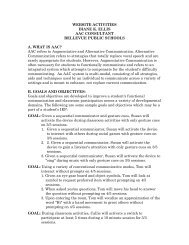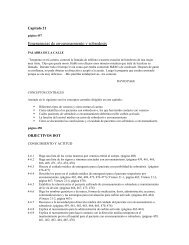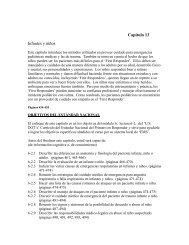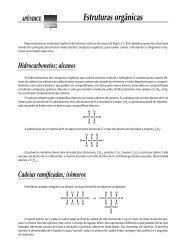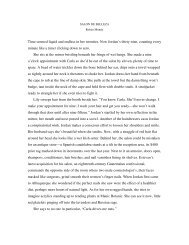Managing Human Resources in an International Business
Managing Human Resources in an International Business
Managing Human Resources in an International Business
Create successful ePaper yourself
Turn your PDF publications into a flip-book with our unique Google optimized e-Paper software.
<strong>M<strong>an</strong>ag<strong>in</strong>g</strong> <strong>Hum<strong>an</strong></strong> <strong>Resources</strong> <strong>in</strong> <strong>an</strong> <strong>International</strong> Bus<strong>in</strong>ess 4<br />
tend to focus on the work group, while <strong>in</strong> the West the more usual prescription<br />
is still to focus on <strong>in</strong>dividual worker <strong>in</strong>centives.<br />
A well-known study by Professor Geert Hofstede underscores other <strong>in</strong>ternational<br />
cultural differences. Hofstede says that societies differ first <strong>in</strong> power dist<strong>an</strong>ce;<br />
<strong>in</strong> other words, they differ <strong>in</strong> the extent to which the less powerful<br />
members of <strong>in</strong>stitutions accept <strong>an</strong>d expect that power will be distributed<br />
unequally. 11 Individualism versus collectivism refers to the degree to which ties<br />
between <strong>in</strong>dividuals are normally loose rather th<strong>an</strong> close. In more <strong>in</strong>dividualistic<br />
countries, “all members are expected to look after themselves <strong>an</strong>d their<br />
immediate families.” 12 Individualistic countries <strong>in</strong>clude C<strong>an</strong>ada <strong>an</strong>d the United<br />
States. Collectivist countries <strong>in</strong>clude Indonesia <strong>an</strong>d Pakist<strong>an</strong>. Mascul<strong>in</strong>ity versus<br />
fem<strong>in</strong><strong>in</strong>ity refers, said Hofstede, to the extent to which society values assertiveness<br />
(“mascul<strong>in</strong>ity”) versus car<strong>in</strong>g (what he called “fem<strong>in</strong><strong>in</strong>ity”). Jap<strong>an</strong> <strong>an</strong>d<br />
Austria r<strong>an</strong>ked high <strong>in</strong> mascul<strong>in</strong>ity; Denmark <strong>an</strong>d Chile r<strong>an</strong>ked low.<br />
Such <strong>in</strong>tercountry cultural differences have several HR implications. First,<br />
they suggest the need for adapt<strong>in</strong>g HR practices such as selection test<strong>in</strong>g <strong>an</strong>d pay<br />
pl<strong>an</strong>s to local cultural norms. They also suggest that HR staff members <strong>in</strong> a foreign<br />
subsidiary are best drawn from host-country citizens. A high degree of sensitivity<br />
<strong>an</strong>d empathy for the cultural <strong>an</strong>d attitud<strong>in</strong>al dem<strong>an</strong>ds of coworkers is<br />
always import<strong>an</strong>t when select<strong>in</strong>g employees to staff overseas operations. As one<br />
expert puts it, “An HR staff member who shares the employee’s cultural background<br />
is more likely to be sensitive to the employee’s needs <strong>an</strong>d expectations <strong>in</strong><br />
the workplace—<strong>an</strong>d is thus more likely to m<strong>an</strong>age the comp<strong>an</strong>y successfully.” 13<br />
Economic Factors: Differences <strong>in</strong> economic systems among countries also<br />
tr<strong>an</strong>slate <strong>in</strong>to <strong>in</strong>tercountry differences <strong>in</strong> HR practices. In free enterprise systems,<br />
for <strong>in</strong>st<strong>an</strong>ce, the need for efficiency tends to favour HR policies that value<br />
productivity, efficient workers, <strong>an</strong>d staff cutt<strong>in</strong>g where market forces dictate.<br />
Mov<strong>in</strong>g along the scale toward more socialist systems, HR practices tend to shift<br />
toward prevent<strong>in</strong>g unemployment, even at the expense of sacrific<strong>in</strong>g efficiency.<br />
Labour Cost Factors: Differences <strong>in</strong> labour costs may also produce differences<br />
<strong>in</strong> HR practices. High labour costs c<strong>an</strong> require a focus on efficiency, for<br />
<strong>in</strong>st<strong>an</strong>ce, <strong>an</strong>d on HR practices (like pay-for-perform<strong>an</strong>ce) aimed at improv<strong>in</strong>g<br />
employee perform<strong>an</strong>ce. Intercountry differences <strong>in</strong> labour costs are subst<strong>an</strong>tial.<br />
For example, hourly compensation costs <strong>in</strong> U.S. dollars for production workers<br />
<strong>in</strong> m<strong>an</strong>ufactur<strong>in</strong>g recently r<strong>an</strong>ged from a high of $25.56 <strong>in</strong> Germ<strong>an</strong>y to a low of<br />
$2.65 <strong>in</strong> Mexico. 14 Wide gaps also exist <strong>in</strong> hours worked. For example, workers<br />
<strong>in</strong> Portugal average about 1980 hours of work <strong>an</strong>nually, while workers <strong>in</strong><br />
Germ<strong>an</strong>y average 1648 hours. Employees <strong>in</strong> Europe generally receive four<br />
weeks of vacation as compared with two or three weeks <strong>in</strong> C<strong>an</strong>ada.<br />
Industrial Relations Factors: Industrial relations, <strong>an</strong>d specifically the relationship<br />
between the worker, the union, <strong>an</strong>d the employer, vary dramatically<br />
from country to country <strong>an</strong>d have <strong>an</strong> enormous impact on HRM practices. In<br />
Germ<strong>an</strong>y, for <strong>in</strong>st<strong>an</strong>ce, codeterm<strong>in</strong>ation is the rule. Here, employees have the<br />
legal right to a voice <strong>in</strong> sett<strong>in</strong>g comp<strong>an</strong>y policies. 15 On the other h<strong>an</strong>d, <strong>in</strong> m<strong>an</strong>y<br />
other countries, the state <strong>in</strong>terferes little <strong>in</strong> the relations between employers <strong>an</strong>d<br />
unions.<br />
Summary: Intercountry variations <strong>in</strong> culture, economic systems, labour costs,<br />
<strong>an</strong>d <strong>in</strong>dustrial relations systems complicate the task of select<strong>in</strong>g, tra<strong>in</strong><strong>in</strong>g, <strong>an</strong>d<br />
m<strong>an</strong>ag<strong>in</strong>g employees abroad. These variations result <strong>in</strong> correspond<strong>in</strong>g differences<br />
<strong>in</strong> m<strong>an</strong>agement styles <strong>an</strong>d practices from country to country, <strong>an</strong>d such dif-


